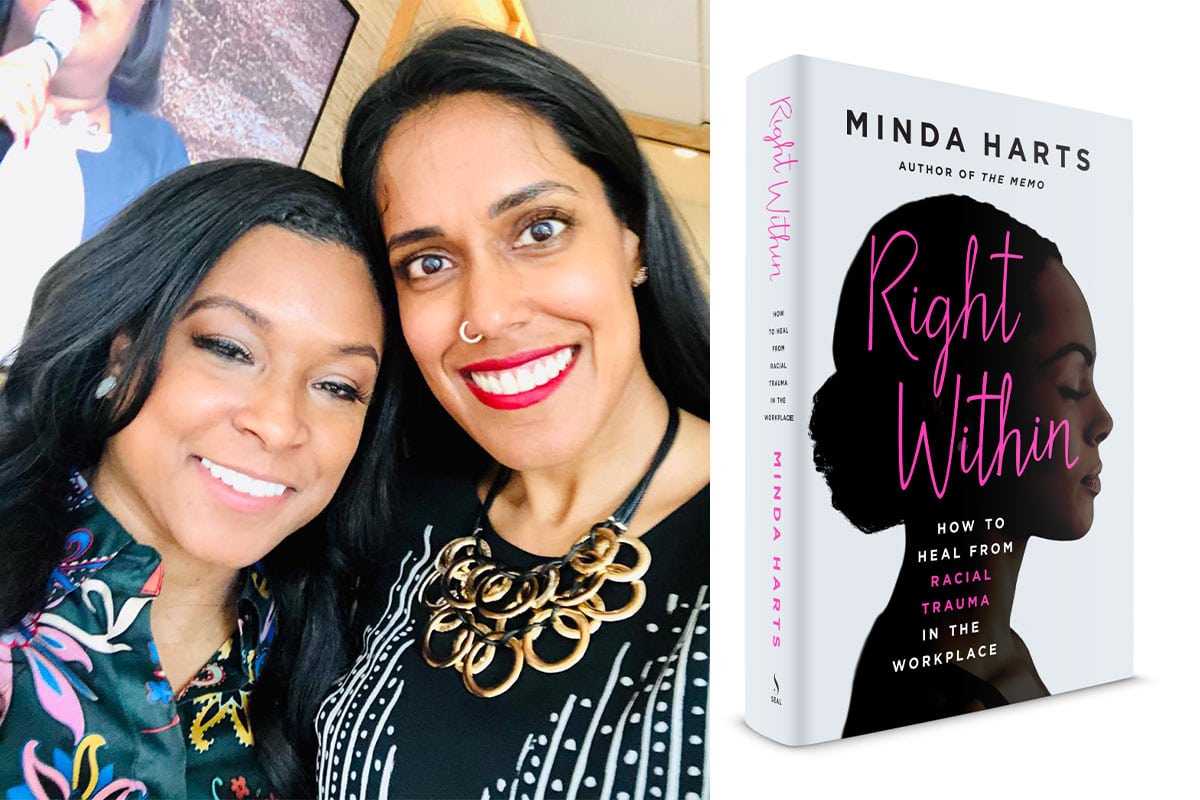
by Minda Harts, author of Right Within: How to Heal from Racial Trauma in the Workplace (Seal Press)
According to a recent report on The State of Black Women in Corporate America, “49% of Black women feel that their race or ethnicity will make it harder for them to get a raise, promotion, or chance to get ahead.” It’s more than a feeling. For my latest book Right Within: How to Heal from Racial Trauma in the Workplace, I interviewed more than 200 women of color in diverse fields. The common through line: Racism had killed the careers they’d originally envisioned for themselves.
These women — like myself — have moved on, often “built back better.” But there are scars covering trauma ranging from blatant racism to microaggressions; the pain of being overlooked for plum assignments; managed by “leaders” who failed to create environments where everyone could thrive. Women of color, particularly BIPOC women, too often are told to keep going, be strong, be grateful. Left untended, those wounds compromise future success and — most important — physical and mental well-being.
In Right Within, I get vulnerable and ask my readers to do so as well, reflecting on racialized traumas in the workplace before offering concrete tools for healing. Some of the important inclusion topics discussed in my book include:
I’ll leave you with one final takeaway from Right Within: “The burden shouldn’t be ours to carry, but we can help each other tell the truth, validate our experiences, and let go of what we can. We can give ourselves space to reaffirm our value first to ourselves, and then to everyone in the boardroom. We need to breathe easier so we can take our rightful place at the table. We deserve to be right within.”
Learn more about healing racial trauma in the workplace in Right Within.
Sign up for bci’s mailing list to get the latest diversity, equity and inclusion insights right to your inbox every month.
The bci team primarily works from lands that are part of the Dish With One Spoon Territory, a treaty between the Anishinaabe, Mississaugas, and Haudenosaunee that brought these communities together to share, serve, and protect these lands.
bci is deeply committed to honoring the spirit of this treaty, and we recognize our privilege in enjoying the benefits of these lands, which supports all that we do. We’re passionately focused on undertaking our work in alignment with the values of Truth and Reconciliation, and we actively seek to decolonize societal and workplace systems, as well as our individual behaviors.
Komal is bci’s Senior DEI Consultant and Mental Health Expert-in-Residence and an accomplished DEI facilitator, coach, and strategist. Komal has over 20 years of experience in providing strategic and advisory guidance and program development across a range of sectors, with a particular concentration in mental health and racial inclusion. Komal is also the founder of Insayva Inc., a social enterprise focused on providing accessible DEI and health equity support to charities and non-profit organizations.
Komal has extensive experience in creating and delivering programming in a range of leadership and DEI areas, including mental health inclusion, psychological safety, empathy, relationship repair, allyship, and cultural competence. She is passionate about driving transformational change in workplaces and has worked closely with bci clients – corporations, professional service firms, health care providers, and educational institutions – to embed cultures of inclusion within their organizations.
Komal has provided one-on-one inclusion coaching to hundreds of senior leaders and brings a unique approach that is informed by her background as a therapist. She is able to expertly handle sensitive conversations and situations and works with leaders to develop the knowledge and skills necessary to advance racial/ethnocultural, gender, and mental health-related equity across teams and organizations. Komal also offers a performance coaching program designed specifically for BIPOC leaders. This program aims to help BIPOC leaders harness their place, position, and identity to thrive in the workplace and beyond. Komal is a qualified administrator of the Intercultural Development Inventory (IDI).
As bci’s Mental Health Expert-in-Residence, Komal offers tremendous expertise around workplace mental health. As a doctoral trained mental health clinician, certified health executive, and registered social worker, Komal has assisted organizations looking to advance employee mental health inclusion and well-being through offering programming on inclusive dialogue, anti-stigma, burnout prevention, psychological safety, resilience, and self-care. Komal is committed to advancing mental health and wellness across the life course; she currently serves on the board of the Alzheimer’s Society of Ontario and previously served on the boards of Children’s Mental Health Ontario and the YMCA of Greater Toronto.
When Komal is not working, you’ll find her painting, cooking, or snuggling with her cats.